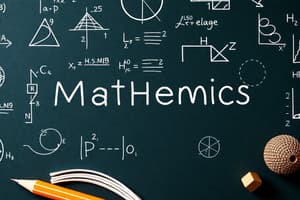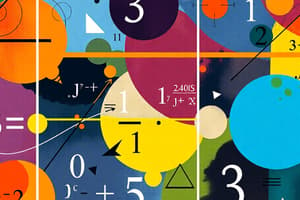Podcast
Questions and Answers
What does algebra primarily focus on?
What does algebra primarily focus on?
- Properties of numbers
- Likelihood of events occurring
- Shapes and sizes
- Manipulating mathematical symbols and equations (correct)
Which branch of mathematics involves the study of continuous change?
Which branch of mathematics involves the study of continuous change?
- Statistics
- Algebra
- Calculus (correct)
- Geometry
What does the Pythagorean Theorem describe?
What does the Pythagorean Theorem describe?
- The area of circles
- The relationship in right-angled triangles (correct)
- The sum of angles in any triangle
- The properties of parallelograms
Which concept involves the collection and analysis of data?
Which concept involves the collection and analysis of data?
Which type of number encompasses both real and imaginary components?
Which type of number encompasses both real and imaginary components?
What is a key operation associated with the concept of sets?
What is a key operation associated with the concept of sets?
Which of the following best describes vectors?
Which of the following best describes vectors?
What is the main application of mathematics in engineering?
What is the main application of mathematics in engineering?
Flashcards
Algebra
Algebra
Manipulating mathematical symbols and equations.
Geometry
Geometry
Study of shapes, sizes, and spatial relationships.
Calculus
Calculus
Study of continuous change (differentiation and integration).
Pythagorean Theorem
Pythagorean Theorem
Signup and view all the flashcards
Sets
Sets
Signup and view all the flashcards
Functions
Functions
Signup and view all the flashcards
Differentiation
Differentiation
Signup and view all the flashcards
Integration
Integration
Signup and view all the flashcards
Study Notes
Introduction to Mathematics
- Mathematics is a fundamental field of study encompassing logic, quantity, structure, space, and change.
- It uses abstract concepts and symbolic representations to model and solve problems.
- Branches of mathematics include algebra, geometry, calculus, number theory, and statistics, among others.
- Mathematics plays a crucial role in various scientific disciplines and technological advancements.
Key Branches of Mathematics
- Algebra: Focuses on manipulating mathematical symbols and equations.
- Geometry: Deals with shapes, sizes, and spatial relationships.
- Calculus: Involves the study of continuous change, including differentiation and integration.
- Number Theory: Examines the properties of numbers.
- Statistics: Involves the collection, analysis, and interpretation of data.
- Probability: Deals with the likelihood of events occurring.
Fundamental Concepts
- Sets: Collections of objects. Key operations include union, intersection, and complement.
- Logic: Principles of reasoning and deduction, including statements, connectives, and quantifiers.
- Functions: Relationships between input and output values. Key types include linear, quadratic, exponential, and trigonometric.
- Equations and Inequalities: Statements of equality or inequality involving variables.
- Proofs: Logical arguments demonstrating the validity of a mathematical statement.
- Numbers: Various sets and types of numbers, such as natural numbers, integers, rational numbers, irrational numbers, and real numbers.
Some Specific Mathematical Principles
- The Pythagorean Theorem: In a right-angled triangle, the square of the hypotenuse is equal to the sum of the squares of the other two sides.
- Differentiation: Finding the instantaneous rate of change of a function.
- Integration: Finding the accumulated change or area under a curve.
- Complex Numbers: Numbers containing imaginary components along with real components.
- Matrices: Rectangular arrays of numbers used for various mathematical operations, especially in linear algebra.
- Vectors: Quantities with both magnitude and direction.
Applications of Mathematics
- Physics: Used in describing motion, forces, and energy.
- Engineering: Essential for designing structures, machines, and systems.
- Computer Science: Used in algorithms, data structures, and cryptography.
- Finance: Crucial for modeling investments, risk assessment, and financial markets.
- Economics: Used in forecasting, modeling, and analyzing economic phenomena.
- Biology: Helps in modeling biological systems and processes.
Different Mathematical Methods
- Mathematical Modeling: Constructing mathematical representations of real-world phenomena.
- Problem Solving: Formulating mathematical strategies needed to answer mathematical questions.
Studying That Suits You
Use AI to generate personalized quizzes and flashcards to suit your learning preferences.




